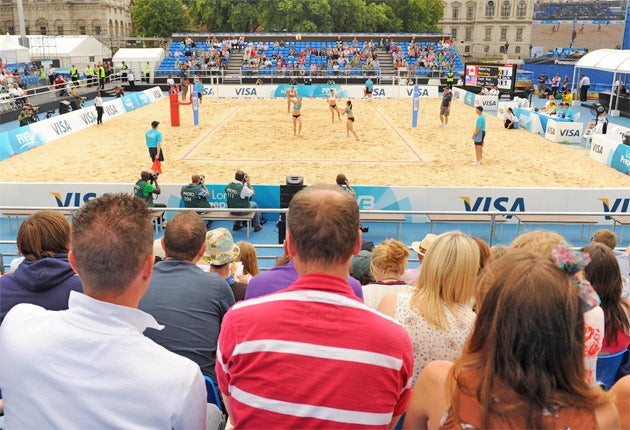Business as usual at London 2012 test event
Ugandan team talk of frantic phone calls from home but beach volleyball passes without incident

Your support helps us to tell the story
From reproductive rights to climate change to Big Tech, The Independent is on the ground when the story is developing. Whether it's investigating the financials of Elon Musk's pro-Trump PAC or producing our latest documentary, 'The A Word', which shines a light on the American women fighting for reproductive rights, we know how important it is to parse out the facts from the messaging.
At such a critical moment in US history, we need reporters on the ground. Your donation allows us to keep sending journalists to speak to both sides of the story.
The Independent is trusted by Americans across the entire political spectrum. And unlike many other quality news outlets, we choose not to lock Americans out of our reporting and analysis with paywalls. We believe quality journalism should be available to everyone, paid for by those who can afford it.
Your support makes all the difference."It would be normal back home," said Alice Gitta Okecho, "but we thought we were coming to the safest place in the world."
She looked at her partner, Josephine Nammanda, the other half of the Ugandan team, and shrugged. Then a grin spread across her face, she nudged Nammanda and pointed across St James's Park. "But you can't feel unsafe – not with the Queen living over there."
It may not have been fiddling while Rome burnt, but Horse Guards was a frequently surreal place yesterday. A temporary beach and stands for 1,500 people were spread beneath the stone-clad gaze of a couple of Field Marshals, namely Wolseley and Roberts, sitting atop their solid grey horses. The sun shone, music echoed off disapproving Whitehall walls and bikinied dancers kept the crowd entertained in between matches between bikinied beach volleyballers, who afterwards dutifully answered questions about riots across London.
The Roberts statute is a replica of a larger one than stands in Kolkata; The Times of India was one of a succession of global newspapers to carry headlines raising safety questions around next year's Olympics. Concerns matched in Australia, Jamaica and, most vocally, China. "They are wrong," said Hugh Robertson, the Minister for the Olympics, on claims in the Chinese media that London's security preparations are inadequate.
The test event, though, went ahead – there was never any thought given to cancelling it – and will continue for the rest of the week, although matches were moved on to warm-up courts to allow the day's action to be completed early. A statement from Locog, the London Olympic organisers, said: "We feel this is a sensible and pragmatic approach, given recent events in London."
The day wrapped up – happily enough – 90 minutes early. "We will do whatever to not even risk putting in danger anybody here," said Angelo Squeo, the event director. Business as unusual has been the line pushed by Locog to prepare residents of the capital for next summer, but yesterday it was as close as possible to sport as usual, as much as beach volleyball can be seen as the sporting norm. Not far away, 200 delegates from National Olympic Committees waited in their Park Lane hotel to be addressed by Robertson. Today they are scheduled to tour the Olympic Park in east London. Also in town is Denis Oswald, the International Olympic Committee's man in charge of overseeing London's preparations. The IOC yesterday gave London its full backing, while Robertson spent last night assuring the delegates that the capital will cope next year.
The other test events over the coming days – marathon swimming in Hyde Park, cycling which starts and finishes on the Mall and the world badminton championships at Wembley – will also carry on as planned. "Life doesn't stop, does it?" said Nanak Singh, a 69-year-old from near Heathrow who had come with his family. "And the weather's fine!"
Vicky Hale, from St Neots, Cambridgeshire, gave what became the day's stock reply to the stock question. She shrugged and said: "Why would you be put off coming?" Among the officials and volunteers – working in Horse Guards will, I suspect, come to be regarded as the plum job among volunteers if the smiles on the faces of the teenage boys charged with raking the sand in between games were anything to go by – there was a reluctance to be drawn on events elsewhere in the capital. It was as if here was a parallel Games universe. It certainly felt like a city of two halves. The music from the beach volleyball could be heard in Downing Street.
"It would be nothing unusual at home in Kampala," said Okecho. "But here! We have been getting phone calls from back home asking if we are OK."
The players, who are staying in central London well away from any of the trouble spots, were largely unphased. "For an athlete like myself it is more an awareness than a concern," said Brittany Hochevar from the United States.
"You'll have incidents anywhere you are in the world. It doesn't matter. If you are in a big city this could happen anywhere in the world, so this doesn't change my perception of London for 2012 or give me concern for the Olympics. That's the world."
Join our commenting forum
Join thought-provoking conversations, follow other Independent readers and see their replies
Comments